#melodrama saved 2017
Note
Please recommend Drarry fanfics where they are figuring out life and just going through motions after war. Would love if there are themes of found family too.
Hello anon! Oh man, do I love this trope. Here are some of my favorites:
Too hard to be lived without by @harryromper (2018, T, 3k)
Or, in which Draco manages to find some peace until Harry comes barrelling back into his life.
Five Years by @shiftylinguini (2017, M, 4.6k)
For Draco, December means finding somewhere he can lose himself in the thrum of a crowd and the throb of music ― and Potter. It always means Potter now, too.
Turn and Face the Strange (time may change me) by @punk-rock-yuppie (2019, T, 16k)
Draco and Harry and how their relationship—and themselves—change over the course of eleven years.
Poor Unfortunate Souls by @doubleappled (2019, E, 19k)
Draco is a potioneer. Harry is trying to save his sex-challenged marriage. Everything is a mess, but at least there's an octopus in the lobby.
A Year in Training by Omi_Ohmy (2013, M, 25k)
Harry is finally living his dream and training as an Auror, but nothing seems to be going right: he’s just so angry all the time. And Draco Malfoy’s presence on the programme really isn’t helping with that, either.
Rebel, Rebel by @makeitp1nk (2022, E, 29k)
Thirty-six year old Harry Potter is the coolest bloke in muggle Camden Town. That’s right — he’s left the wizarding world behind and has been living his best life ever since. But will one chance encounter with a certain blond from his past change everything? Yeah, probably.
Things Unknown but Longed for Still by @cassiaratheslytherpuff (2021, E, 29k)
Harry feels trapped by the unwanted fame he received after the war. Everyone has an expectation of who he is before they meet him, and they all want a piece of the famous Harry Potter. Feeling unable to connect to anyone and imprisoned in the life of someone he doesn’t recognise as himself, Harry turns to Ron and Hermione who set him up on an anonymous dating site and helps him find a place to escape. Free from all the expectations placed on him Harry starts to heal, and the anonymous man he meets on the dating site shows him love might not be as impossible as he’d feared.
War Wounds by SilentAuror (2007, E, 30k)
Some wounds take longer to recover from than others. HP/DM, with background HP/GW. Themes of alcoholism, love triangles, and dubious fidelity.
On One's Knees by pir8fancier (2008, E, 33k)
The war is over and to the victors go the spoils. If you are triggered by infidelity, this is not the fic for you.
Open For Repairs by @drarrytrash (2015, M, 35k)
After the war, Draco works at a tv repair shop and Harry breaks things.
(Un)Wanted by @aibidil (2020, E, 36k)
Ginny's pregnant, then she's not and Harry's single. Harry, again with no family, doesn't know what to do with this turn of events, or how to find a new life—post-war, post-Ginny, post-abortion—in which he belongs. He doesn't expect that life to include dancing to the Backstreet Boys with Hermione and Draco Malfoy. A story of finding belonging in the unexpected.
Here's The Pencil, Make It Work by ignatiustrout (2013, M, 49k)
Harry thinks "Why is Malfoy working in a coffee shop in muggle London?" is a much simpler question than, "Are you going to accept that auror offer and, if you don't, what will you do?"
Modern Love by @tackytigerfic (2020, E, 60k)
Harry Potter, of all people, knows that life isn’t always fair. And no one gets to be happy all of the time. But surely there’s something more—something better—than a rubbish Ministry job, and a lonely old house, and that feeling that everyone out there is doing a better job of living than Harry is.
The Way Down by @letteredlettered (2015, T, 65k)
Harry is overwhelmed by his own power and fame and angst, so he's become a hermit. Draco Malfoy is tired of the melodrama.
153 notes
·
View notes
Text
Top 20 Chinese Movies of All Time:
1. "Raise the Red Lantern" (1991) - Directed by Zhang Yimou, this film is a masterpiece of Chinese cinema and follows the life of a young concubine in the 1920s.
2. "Farewell My Concubine" (1993) - Directed by Chen Kaige, this film tells the story of two Peking Opera performers and their lives over the course of several decades.
3. "To Live" (1994) - Also directed by Zhang Yimou, this film is an epic family drama set against the backdrop of China's tumultuous 20th century.
4. "Crouching Tiger, Hidden Dragon" (2000) - Directed by Ang Lee, this film is a martial arts masterpiece that tells the story of two warriors in ancient China.
5. "In the Mood for Love" (2000) - Directed by Wong Kar-wai, this film is a visually stunning and emotionally powerful story of love and loss in 1960s Hong Kong.
6. "Hero" (2002) - Directed by Zhang Yimou, this film tells the story of a nameless warrior who is tasked with assassinating the king of a rival kingdom.
7. "House of Flying Daggers" (2004) - Also directed by Zhang Yimou, this film is a romantic martial arts epic set in ancient China.
8. "The Road Home" (1999) - Directed by Zhang Yimou, this film is a simple yet moving love story set in a rural Chinese village.
9. "Red Sorghum" (1987) - Directed by Zhang Yimou, this film is a visually stunning and emotionally powerful tale of love and war set in 1930s China.
10. "To Be a Better Man" (2016) - Directed by Zhang Xiaobo, this TV series tells the story of a successful businessman who undergoes a personal transformation after a health scare.
11. "The Story of Qiu Ju" (1992) - Directed by Zhang Yimou, this film is a satirical look at China's bureaucratic system and follows the story of a woman seeking justice for her husband.
12. "A Touch of Sin" (2013) - Directed by Jia Zhangke, this film is a violent and uncompromising look at contemporary China and the social and economic issues facing its people.
13. "Spring in a Small Town" (1948) - Directed by Fei Mu, this film is a classic Chinese melodrama about a woman caught between her husband and her first love.
14. "The Great Wall" (2016) - Directed by Zhang Yimou, this film is a fantasy epic that tells the story of a group of warriors defending China against monsters.
15. "The Grandmaster" (2013) - Directed by Wong Kar-wai, this film is a biographical drama about the life of legendary martial arts master Ip Man.
16. "The Mermaid" (2016) - Directed by Stephen Chow, this film is a hilarious and heartfelt comedy about a mermaid who falls in love with a businessman.
17. "The Monkey King" (2014) - Directed by Soi Cheang, this film is a fantasy adventure that retells the classic Chinese tale of the Monkey King.
18. "The Wandering Earth" (2019) - Directed by Frant Gwo, this sci-fi film is a thrilling and visually stunning tale of humanity's efforts to save the Earth from destruction.
19. "Ip Man" (2008) - Directed by Wilson Yip, this film is a biographical drama about the life of legendary martial arts master Ip Man, who trained Bruce Lee.
20. "Wolf Warrior 2" (2017) - Directed by Wu Jing, this film is an action-packed thriller about a Chinese soldier who goes on a mission to rescue civilians in an African warzone.

5 notes
·
View notes
Text
Twin Peaks: an interpretation.

I recently finished watching Twin Peaks, the tv series and franchise created by director David Lynch and writer Mark Frost. I’m 30 years late to the series, but it’s been a major influence on later media I’ve enjoyed (oddly enough mainly games like Max Payne and Kathy Rain), so I decided to watch it. And now I finished practically all of it, the original two seasons from 1990-91, the 1992 theatrical movie Twin Peaks: Fire Walk with Me (and also the compilation of deleted scenes from the film called The Missing Pieces), and finally the 2017 revival that brought the series a third season. I have thoughts. Reviews of the tie-in books will follow soon.
As I wrote this essay, I realized that I put major spoilers into the text because the later plot developments of this series naturally influence my reading of its themes, and I want to talk about them. Granted, I think spoilers don’t matter that much. Sometimes reading about an interesting twist in the story can make me interested in experiencing a piece of media in a way that a “spoiler-free” description would not.Twin Peaks is a franchise about mystery but not about solving them, so spoilers don’t hurt it that much (even if it clearly goes for shock at some point). So even if you haven’t seen anything of Twin Peaks, you might still read on and see if my words might pique your interest in actually watching it, it’s up to you. Still you might want to experience it as fresh as possible, so I’m going to write a short summary of my views on the show. It will introduce the subject and be a tl:dr if you don’t want to read almost 6000 words. The rest of the article will be put after a read-more link, which includes a more detailed analysis and spoilers of the later plot elements
The Short introduction to Twin Peaks
Twin Peaks starts with a seemingly simple murder mystery. In the small American town of Twin Peaks (in Washington State) a teenager named Laura Palmer is murdered, and the FBI agent Dale Cooper arrives to investigate. Yet the series is a lot more that that. It is also a complex depiction of the eccentric inhabitants of Twin Peaks, mixing genres like melodrama, soap opera and comedy. The murder mystery soon is revealed to have possible supernatural elements. The storytelling is surrealistic, with characters having strange visions and doing absurd things. Twin Peaks is also a high (as in deliberate) camp melodrama. Yet the show is not smugly ironic, just self-aware and actually wears its heart on its sleeve. It depicts its eccentric characters with compassion, and at its heart is an earnest depiction of a struggle between good and evil, especially evil in the form of violence against women.
The show is very well-made, pioneering the use of cinematic techniques in television, brought to the show by director David Lynch, and complex serialized plots, as written by Mark Frost. The premature reveal of the murderer of Laura Palmer in the second season hurt the show, and left it somewhat aimless in the second half of season 2. Yet there are still highlights even in those flawed episodes, and an excellent finale, but that couldn’t save it from cancellation. David Lynch directed a feature film prequel to the TV series called Twin Peaks: Fire Walk with Me. it was commercially unsuccessful, but in my opinion not artistically so. It focuses on the last days of Laura Palmer, and is a very moving and horrific depiction of child sexual abuse.
Eventually the series got a third season in 2017. It’s a darker show that focuses more on the horror and surreal elements of Twin Peaks, without forgetting about neither the camp and comedy elements or the earnest heart of the original. It’s excellent if often disturbing, and one of the most daring and innovative seasons of television ever made.
Twin Peaks is a classic and cultural touchstone for a reason, it’s just so well-made, original and brave, in a way that is genuinely emotionally affecting and thought provoking. There really is nothing else like it.
That was the short version of what I think about Twin Peaks. The rest is under the cut. Be mindful of discussions of rape and other forms of violence, and as mentioned before, spoilers.
The Long Introduction to Twin Peaks
Twin Peaks is a good example of how originality does not consist of making things up out of thin air, but in combining your various influences. The series is a combination of genres. It starts as a murder mystery, with the discovery of a dead body. But the mystery is almost just a pretext to examine the eccentric inhabitants of the small town of Twin Peaks (which has become a pop culture icon of small towns in the Pacific Northwest region of the US). Then the series reveals itself as a soap opera pastiche, with complex romantic, criminal and business intrigues. It also is a comedy, with the town’s eccentric inhabitants depicted with a gentle humour. And then we get fantasy/supernatural horror, as the supernatural elements soon make an entrance as characters have strange visions. Twin Peaks is like an almost encyclopedic summary of television and popular fiction up to that point.
Despite the extensive use of established tropes from popular fiction, the take on them Twin Peaks is extremely off-kilter and weird. Conventional realism is almost completely abandoned. The supernatural elements are maybe the most famous and obvious, taking mostly the form of bizarre visions and dream sequences involving plenty of mysterious dialogue from dancing men in red, dead characters like Laura Palmer, owls, an evil spirit called Bob (who despite his name is genuinely frightening) and a friendly giant. Different characters have visions of Bob, and the dreams reveal enough of the truth and affect the world outside of them to not be able to be dismissed as just hallucinations.
Even the seemingly mundane events have a strangeness to them. People behave in weird and unexplained ways, like carrying around a log and talking to it. Our hero Dale Cooper does things like record tapes to send to a co-worker containing not just info on the case, but his random musings on everything, sometimes while hanging upside down with the help of the coffee pots he wears on his feet.
The acting is deliberately stylized, exaggerated and melodramatic, giving even normal emotions like grief or romantic love between teenagers an unreal feeling. Its storytelling harkens to Douglas Sirk’s melodramas or soap operas, and the show is aware of this. It’s very much high camp (as in deliberate camp) and has a lot of surreal humour involved. In the first season there is a show-within-the-show called Invitation to Love, which is a more obvious soap opera parody and whose events mirror the plots of Twin Peaks. The show’s use of pop fiction clichés might otherwise serve to anchor the show, but it also draws attention to the artificiality of the show’s fiction (especially as it is made almost explicit by Invitation to Love).
The series was in general groundbreaking for the time period. Lynch brought both cinematic technique and a surrealist art film edge to the series that had been almost unknown in television up to that point. The writing, in which the show other’s creator Mark Frost had a major part, was just as influential. The show’s serialized nature, complex plotting, ongoing mysteries and unexplained surreal events would influence almost all television that came after it. Yet it would almost always be in simplified form, without the surreal melodrama of Twin Peaks.
And this complexity applies to the characterization. The characters may be broadly drawn in a melodramatic fashion, but they all have complexity. There is a recurring theme of duality in personality, people might present only one side of who they are at first, but then reveal a second side, that can be the opposite of the first. This is a theme with Twin Peaks as a community in general and Laura Palmer in particular, more on that later. For example, the FBI pathologist Albert Rosenfeld is both snarky and mean to an almost pathological degree and also a committed pacifist who believes in universal love. Audrey Horne loves to play the role of a femme fatale, but is actually an innocent and noble soul.
This reveal of hidden sides often serve to reveal the show’s warm heart, which it wears on its sleeve. The melodrama is self-aware, but the series is not at all a smugly ironic parody. It’s self-aware of what it is doing, not putting itself above it. There is a strong sense of warmth and empathy of the show’s depiction of various eccentrics. Even characters that are very much comic relief, like the sheriff’s deputy Andy Brennan and the sheriff’s office receptionist Lucy Moran are subtly given a sense of respect and dignity by the series, another case of duality.
The show’s horrific side shows a sense of compassion for the victims of violence and murder depicted. It is at heart a tv series that earnestly depicts a struggle between good people like Dale Cooper and Sheriff Truman and supernatural evil in the form of The Black Lodge and Bob.
“The Evil that Men do”
This evil is often expressed as violence and oppression against women. This theme is set pretty much immediately with the starting premise of the murder of Laura Palmer.
Yet this extensive problem of violence against women doesn’t end with her. This problem seems to run through the town of Twin Peaks. It is itself is an example of this duality theme. It initially presents this image of an idyllic small town that even Cooper is taken in by. Aesthetically the town has a lot of characteristics of the idealized pop cultural image of the American 1950s, an image that practically symbolizes the self-justifying dream image of American patriarchal capitalism.
But the show then reveals the dark side of corruption and violence against women running underneath this facade. It is something that runs through Twin Peaks. You can see it in its poorest citizens, with how Shelly Johnson is abused by husband Leo who is a small-time drug dealer and trucker. But perhaps this corruption is strongest in the town’s upper class.
Benjamin Horne could as the town’s leading capitalist in some sense be described as a patriarch of the entire town of Twin Peaks, and he is quickly revealed to be rotten. His wealth is built on literal crimes, including murder and prostitution of young girls. He even has a system for transferring teenage girls working at the perfume counter in his department store to a brothel he owns. The owning family of the towns monopolized logging industry, the Packards, are similarly corrupt.
“Laura is the One”
The Palmer family in particular expresses this dark duality and hypocrisy most strongly, because at first glance they seem to perfectly fulfil the ideal of the 1950s nuclear family. Leland is the patriarch of the family and the breadwinner, his wife Susan is a housewife, and his daughter is the ideal of young femininity, the homecoming queen (as depicted in the idealized portrait of her that is such an icon of the show).
Yet this is all subverted once we learn the truth of Laura’s murder.
We eventually learn that Leland is the killer of his daughter, and in a particularly dark example of the duality theme, he is possessed by an evil supernatural spirit, Bob. Bob is connected a place of surreal evil called The Black Lodge, and feeds on pain and suffering (called garmonbozia in the Fire Walk with Me film and it is shown visually as creamed corn, because this show is a strange one). For Laura, her murder was only the culmination of her abuse, as Leland/Bob has haunted and raped Laura ever since she was twelve years old.
Leland is deliberately a complex figure, both victim and perpetrator. He was clearly sexually abused himself by Bob as a child and was then possessed. There is serious implications, especially in Fire Walk with Me,that even if Leland is not entirely in control, he is still responsible for his actions, or that there is some darkness to his character that made him vulnerable to be Bob’s host. It’s complex and ambiguous.
Leland/Bob is also a serial killer, who killed a woman named Teresa Banks before Laura and, in the most horrific scene of the original two seasons, also murdered Laura’s cousin Madeline (Madeline is another case of duality, as she is played by the same actor as Laura, Sheryl Lee).
Susan Palmer is maybe not entirely aware of her husband’s actions, but is aware of much of it and any ignorance or complacency is due to being heavily drugged to keep her from seeing the worst of it. Leland’s abuse of Laura and eventual murder leads her into a mental breakdown. In season 3 her depiction is even darker, as she is revealed to have hosted her own evil spirit, possibly the mysterious Judy, for a long time and at that point is barely even human any more.
Laura however is perhaps the show’s ultimate example of duality, her story reveals the hypocrisy of the whole town, the investigation into her life and death an inroad to the many stories of Twin Peaks. As the log lady says, her story is “the one leading to the many… Laura is the one”. Her “homecoming queen” persona is just a facade, one she keeps up even for her friends, hiding a terribly abused girl. And much of the investigation into her murder is about revealing this duality in her character.
It is implied the abuse made Laura sexually active from a frighteningly young age, and this is then taken advantage of by the men in Twin Peaks. There are of course small-time criminals like Leo Johnson and Jacques Renault who abuse her, yet the richest man in Twin Peaks, Benjamin Horne indirectly led her into prostitution in his brothel and had sex with her himself. Even her psychiatrist Dr. Jacoby had ignored the signs of this abuse and instead developed a creepy infatuation with her. Laura eventually became a cocaine addict, clearly to deal with the psychological damage that started with Bob.
Laura Palmer’s murder is in the end just an expression of the violence of the patriarchal-capitalist society that controls both the town of Twin Peaks and the larger world. There are many good people in Twin Peaks, but any idyllic facade the town presents is hypocritical. This is almost made explicit in Bobby Briggs’s speech at Laura’s funeral. Bobby is not a good person at this point, but his speech is true: “You damn hypocrites make me sick! Everybody knew she was in trouble. But we didn’t do anything. All you good people. You wanna know who killed Laura? You did! We all did.”
One might argue against this feminist reading of Twin Peaks by criticizing the show’s depiction of women as victims, and this focus on their suffering. And there is some ground for that criticism, but it does simplify the depiction of women in this show. The depictions of violence seems to me to invite empathy for the victims rather than exploit their suffering. The women characters are complex and varied, and not all of them are victims. There are elderly eccentrics like the Log Lady Margaret Lanterman (my role model), the extroverted and daring teenager Audrey Horne and the reserved but kind Donna Hayward.
Laura Palmer’s death might start the show, but her character in life is a very important part of the series and becomes a focus of the investigation. She is not a dead body, but a proper character. The exploration of the gulf between her public persona forced upon her by her environment and the suffering person she is inside is a major part of the series. And she eventually becomes a proper on-screen character in Fire Walk with Me. She even reveals the solution to her own murder to Cooper, he doesn’t actually solve it. Instead Laura is able to convey the truth to Cooper via a shared dream, which defies conventional conceptions of time, as she dreams it shortly before her death and Cooper shortly after her death.
She has a will of her own, and stands up to the men in the her life, even at the cost of her own life. Her murder happened because despite the abuse she was too strong and resisted Bob’s attempts to possess her. Season 3, Part 8 implies she even is a kind of saviour figure, a spirit brought to Earth by the White Lodge (the good counterpart to the Black Lodge, a source of supernatural goodness) to resist Bob’s evil. This is surprising at first, but makes sense. Despite enduring terrible abuse, Laura does break the evil cycle by refusing to continue her father’s evil, thus making her death a kind of Christ-like self-sacrifice, denying Bob a new host.
Bob himself, while a supernatural being, is unmistakeably male. After Bob controlling Leland is revealed to be the murderer of Laura Palmer and Madeline, the show’s detectives have a discussion about him. Albert Rosenfeld says that “Maybe that’s all Bob is, the evil that men do”. And he is very much right, at least on what Bob symbolically represents, with the emphasis on “men”. Season 3 reveals that Bob’s creation or entry into the human world was connected to the first atomic bomb test, the Trinity test. It’s a fitting origin, as nuclear weapons is the ultimate expression of the destructive potential of our technological-patriarchal civilization.
“The irresistible urge to rescue every damsel in distress he came across”
Even the hero Cooper is used for a criticism of the male heroes in popular fiction. Not that he is evil, he is genuinely a good man and a hero, to the point he appears to be a perfect person for most of the show. But the season 2 finale and almost everything that follows also reveal his flaws.
His flaw is that he with his well-meaning nature always tries to save women in distress, even when he shouldn’t. Another character in Mark Frost’s tie-in book The Final Dossier diagnoses him with “white knight syndrome, the irresistible urge to rescue every damsel in distress he came across”.
So in the season 2 finale, he ventures into the Black Lodge to do the male hero thing and save a damsel in distress, his girlfriend Annie. There he encounters his own “shadow self” as Deputy Hawk earlier told him but he fails the test of courage it represents. He runs from his evil doppelganger, and it ends with him trapped in the black lodge while Bob has a new host in the doppelganger, partly undoing the effects of Laura’s sacrifice. He spends most of Season 3 in a semi-catatonic state, while his doppelganger runs around doing evil, which he has done for the 25 years at that point. And the season 3 finale is extremely ambiguous, but it could be read as another attempt to rescue a woman only for him making things worse. He tries to rescue Laura Palmer from being murdered in the first place via time travel, only for him to seemingly make things worse and seemingly undoing the world as we know it. His character can be read as a critique of the male hero, a detective who fails where the murder victim succeeds.
“We live inside a dream”
The storytelling itself of Twin Peaks can be seen as a defiance of western values that place a high emphasis on logic and reason (seen as masculine) as opposed to emotion (which is seen as feminine). Twin Peaks often breaks conventional logic and instead has surreal scenes that seem to run on emotional dream logic. Its surrealism is not weird for the sake of being weird, it’s to convey emotions more directly.
In fiction, the mystery genre expresses the rationalist ideology of the western world very strongly, and subverting the genre is often a way to critique it, as in Swiss author Friedrich Dürrenmatt’s classic postmodern novel The Pledge (Das Versprechen), a self-proclaimed “requiem for the detective novel”.
The Laura Palmer murder mystery plot deliberately defy the rationalist plotting of conventional murder mysteries. Cooper is molded in the eccentric genius detective trope, and has similarities to Sherlock Holmes. His sidekick Sheriff Truman explicitly compares himself to Doctor Watson at one point, and thus implicitly Cooper to Holmes. Yet Cooper’s methods is the opposite of the ultra-rationalistic Holmes, he is a mystical detective. He is a weird person who treats insights given to him in dreams as the best way to solve the mystery. And he is completely right about that, conventional police/detective methods don’t solve the crime, and instead he solves the mystery because Laura told him in a dream. And the solution is supernatural, which breaks all the rules of traditional mysteries. If Twin Peaks adapted The Hound of the Baskervilles, there would actually be a ghost hound. He is the perfect detective protagonist for this series because he realizes the importance of dreams and the mystical/supernatural side.
For ultimately Twin Peaks is a world where dreams are reality, and reality is explicitly a dream, as the words “we live inside a dream” and variations thereof eventually becomes a recurring phrase. It is a world that seems to work on dream logic even when the characters are awake, and their dreams affect reality.
Twin Peaks was thus never meant to be a conventional rationalistic mystery, and any attempt to view it as such will leave you disappointed.
“There is a depression after an answer is given”
The subversion of rationalist detective fiction was supposed to go even further. Lynch and Frost originally never intended for the Laura Palmer murder mystery to be solved. But such a reveal eventually happened partway through the second season due to pressure from the network.
They were in some way right, or at least that reveal should have been left to the show’s definite ending, because the reveal at this stage hurt the show. Even if the solution left major questions unanswered (about the supernatural causes behind Laura’s death), the series after that has a clear lack of focus that the murder mystery had previously provided. The show had been about much more than that mystery, but it was a definite focus, a clear A-plot providing intrigue and expectations for the audience. After it is resolution, the writers have difficulty to fill the gap it has left and struggle a bit to find a reason to even keep Dale Cooper in Twin Peaks.
Granted, some of the criticism of the latter half of season 2 feels a bit exaggerated. Even in the worst episodes, they are still interesting and entertaining plots going on that kept me watching, and the rest wasn’t bad enough to ruin the show. I was for example intrigued by the appearance of Denise Bryson (played by a pre X-files David Duchovny), who is a flawed but surprisingly decent portrayal of a trans woman by the standards of early 90s television. There are problems with her character, like how she is played by a male actor, but she is genuinely depicted relatively positively. It shows that Twin Peaks tolerance of eccentrics does extend to queer people, which is nice.
And a highlight of the post-murder mystery season 2 is Kenneth Welsh’s full-hearted portrayal of the over-the-top villain Windom Earle. His antics are fun, but he also provided a clear villain, an A-plot with a sense of threat that the series lacked at that point. The show seem to partly regain its footing with him. His character is also searching for the place of supernatural evil associated with BOB, the Black lodge. That provides a useful lead-in for the show to explore the mystery of that place, which is the main mystery that remains after Laura Palmer’s killer has been revealed. Judging from Mark Frost’s comments on the “Scenes from Another Place” documentary, the Windom Earle plot was intended by him to replace the murder mystery, and it is clearly the plot that has the most force in the latter half of season 2.
Still, the relative lack of involvement from creators David Lynch and Mark Frost showed. It’s definitely a less deftly handled form of surreal melodrama than the show had previously. Subplots often don’t have a point to them in developing the characters of Twin Peaks.
The worst of them is probably when James Hurley leaves the town to go himboing around the country and gets involved in a film noir plot involving an abused wife, Evelyn Marsh, who has her husband murdered. It has nothing to do with anything going on previously in the series, because it is literally not even set in Twin Peaks. James and Donna are involved, but it’s only Evelyn who develops her character through this subplot, not them, and afterwards she disappears from the show. It’s pointless filler.
The lack of the intrigue created by the Laura Palmer mystery seriously hurt the show’s popularity. The mystery of the Black and White Lodges eventually came along to replace it, but it was too late, and it could never rival the popularity of “who killed Laura Palmer” since it is vaguer and less accessible than a murder mystery.
Ratings thus dropped, leading to the show’s cancellation. The season 2 finale was directed by Lynch and is one of the show’s best episodes, with Dale Cooper’s disastrous venture into the Black Lodge, the source of the series’s supernatural evil, being a surreal horror highlight. The episode ended on a frightening cliffhanger, with Cooper being trapped in the Black Lodge while an evil doppelganger of him under the influence of Killer Bob roamed free. But that wasn’t enough to bring the show back.
Fire walk with me
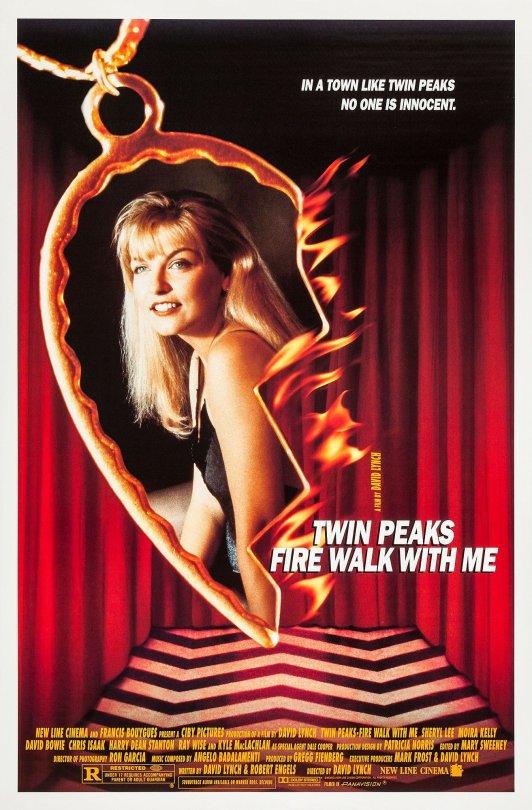
Lynch tried to continue the franchise in the form of theatrical feature films, apparently an entire trilogy was planned at one point, but only one was eventually made: Fire Walk with Me. The film didn’t do very well financially and got bad reviews, leading to the franchise being dormant for over 20 years afterwards. There are probably multiple reasons for this. The Twin Peaks franchise had lost its popularity at this point. The film was also a prequel that didn’t resolve the series finale cliffhanger (even if several scenes refers to it, and a cut scene expanding on it) and it was very different in tone from the series. Freed from the constraints of major network television, Lynch’s film has a very dark tone, with explicit violence. Most of the film is a stark portrayal of the abuse and eventual murder of a young girl, which is a very difficult subject to say the least. The film’s way of telling its story is also very challenging as it goes even farther in the direction of surrealism. It’s an extremely challenging film in both the story being told and how it is told. All that explains why both critics and the general public shied away from it.
Yet they were wrong, the film is nevertheless excellent. It’s for the most part a depiction of the life of Laura Palmer leading up the murder, and showcases her abuse at the hands of Bob and her father, culminating in her murder. It’s a harrowing depiction of child sexual abuse, incest and violence against women, with an excellent performance from Sheryl Lee as Laura. It is far less restrained and more melodramatic than most depictions of this difficult subject, yet contrary to the conventional advice it heightens rather than lessens the horror. And I think it depicts the subject matter in a way that raises empathy with the victim, rather than exploiting the subject. It’s a disturbing but great film.
The compilation of deleted scenes (cut for time), The Missing Pieces, is also worth seeing. The deleted scenes which were first released in 2014 features actors from the tv series whose performances were entirely missing from the finished film, which makes this compilation’s tone closer to the tv series. It’s fun to see them again, especially as it was the last time of several of the actors, like Jack Nance as Pete Martell and Don Davis as Major Briggs would play those roles. It also gives us more hints on Philip Jeffries’s strange situation (although it is still bizarre and unexplained). The compilation also features alternate versions of scenes in the finished film. For example the compilation separates Jeffries’s dialogue in the FBI office with the strange vision of the convenience store which are overlaid on top of the other in the finished film. The separation of the two scenes in The Missing Pieces makes the meaning of both slightly easier to grasp (emphasis on slightly).
“I’ll see you again in 25 years”.

Fire Walk with Me would in many ways set the tone for the revival of the tv series in 2017. Twin Peaks: The Return is not a reboot but a continuation, the long-awaited season 3 of the show. It picks up the story, just 25 years later both in-universe and out of it. It’s amazing that this season was even made after so many years. And it’s a happy coincidence that it came out 25 years after FWWM, as Laura promised she and agent Cooper would meet again in “25 years” in the season 2 finale.
And this time the creators of the series would be entirely in charge, with Lynch directing all 18 episodes and writing them together with Mark Frost. Thanks to being on a cable channel, Season 3 is also free from any heavy censorship. The series can finally openly depict violence and sex and be as surreal as the show’s creators wants, with the result being closer to the theatrical film than the previous seasons of the series.
The resulting season 3 is the most consistent of all three seasons, being essentially one very long film, almost 18 hours long, that is just split into 18 parts for the viewer’s convenience. And it’s an excellent film, which feels just as daring as the original two seasons were. The surreal edge of the original two seasons was one of the least imitated elements of it, always being watered down in imitation. So when the third season is even more surreal and weird it still feels as challenging as back in 1990.
It’s a series that defies any attempts to just be a source of nostalgia and give the viewer more of the same. It’s a very different series from the relatively cozy original, continuing instead the disturbing tone of Fire Walk with Me, while also continuing the storyline and themes of the original.
The actor who plays Cooper, Kyle Maclachlan, returns for season 3, but Cooper as we knew him is mostly absent. Instead we get to see Maclachlan play Cooper’s evil doppelganger while “the good Dale” is initially still trapped in the black lodge. When he gets out after a surreal journey, his mind is apparently damaged, keeping him in a passive state as he takes the place of another doppelganger, Dougie Jones. So while Maclachlan has maybe more screentime than ever, the return of the format of the first two season with Cooper investigating mysteries with his friends in Twin Peaks is explicitly denied.
Season 3 is sometimes subtitled in promotional materials as The Return, but you could argue for a theme being that you can’t step in the same river twice. There is no return to the Twin Peaks of 1990-91, not after 25 years. Even if the people are still there, they have changed and thus you can’t really return to a place you left many years earlier.
The show as said earlier is much darker than before, with the tone set by a couple of gory killings in the first episode. And the series reaches new heights of surrealism and lack of formal explanation and conventional storytelling. The influences of art film is stronger than before, even in the more conventional parts, with long, static shots. Part 8 is almost entirely wordless sequences of surreal imagery.
Season 3 is very much a surreal horror show too, eventually reaching its climax in the finale, which feels like a nightmare, frightening and seemingly inexplicable in a dreamlike fashion. The show ends with Cooper and Laura seemingly trapped in a disturbing alternate universe, where Cooper and Laura and Diane don’t even seem to have their old identities anymore. It’s even more haunting than the cliffhanger of season 2, since it seems to not just have doomed its hero, but undone the very world of Twin Peaks as we know it.
There are relatively positive interpretations like this one by David Auerbach, which argues the ending depicts essentially a sacrifice from Cooper and Laura Palmer to destroy the greater supernatural evil of Judy. It’s compelling, and make sense since the fireman seems to urge Cooper to go to this alternate universe in the very first episode, but can’t really erase the unease caused by this nightmarish ending.
Ultimately the ending is another example of how Twin Peaks is not just serialized, it’s a never-ending serial. The mystery of who killed Laura Palmer was supposed to go on forever. That mystery was resolved due to studio meddling, but then the series kept on introducing new mysteries, like the lodges and ultimately ending the second season on a massive cliffhanger. So season 3 resolves the story of Cooper’s doppelganger and even destroys Bob, but then the finale introduces perhaps the most perplexing mystery yet. It is very uncertain if the series will get a fourth season at this point, yet ending season 3 on such an extremely inconclusive note feels like design, not a mistake.
Yet despite its horror elements, the series has not lost its heart and sense of humour. There is still plenty of camp humour in season 3. And the show still keeps its earnest belief in the power of human goodness. Cooper’s bizarre adventures as Dougie Jones is pure comedy, where the surrounding characters project what they want on the almost totally passive Dougie/Cooper, as he stumbles into a crime drama involving insurance corruption. Yet these characters end up projecting their own good sides on him, and even casino-owning gangsters are shown to have those, making their lives better. It turns the crime drama into a feel-good comedy with happy endings.
And while Twin Peaks has irrevocably changed, the changes are sometimes for the better. Season 3 believes that even drug-dealing juvenile delinquents like Bobby Briggs or ruthless capitalists like Benjamin Horne can achieve some kind of redemption. The depiction of Andy and Lucy has lost none of its gentle and warm comedy, they are now a happy older couple, with a suitably weird son.
Season 3 is a very different but worthy follow-up, and one of the most innovative and daring pieces of television ever made. It’s both funny and disturbing, and remains always interesting and original.
As such, it feels like a worthy follow-up to the original Twin Peaks, which is a cultural touchstone for a very good reason. I have written a lot of words on the series, and yet it feels like I barely scratched the surface, that is how rich and complex it is. It revolutionized television drama, being often-imitated by almost many series on TV in the decades that followed. Yet it was never equalled, because few tv series had the courage to be as daring, weird and big-hearted as Twin Peaks was at its best.
7 notes
·
View notes
Text
welcome to the waiting room !⋆。˚🌿✧˖꩜
➸ greetings hi!!! i'm nadine. xvi. she/her. southeast asian. muslim. student. apparently an isfj. virgo. also bibble and phoebe bridgers enthusiast. late afternoons and afternoon sun my beloved <3
➸ other socials : spotify | storygraph | goodreads | letterboxd | pinterest | instagram | discord : soaperache
➸ (looking for a) creations (myth) : webweave, edits






➸ credits : divider i by @benkeibear, divider ii by @gigittamic, divider iii, super important bibble masterpost by julie <33333 @octoberconstellation -> if you want any of your edits to be removed from here please do say so!!! thank you! <3
important : thepalestineacademy.com, free palestine, on west papua (i)

┏ STEM at heart, but sometimes all i really want to spend the rest of my life doing is reading, pondering over poems, learning to bake, crying over songs, writing in an immense amount and be good at it, watching films and shows new and old, working at a bookshop, collecting so many books that i have sagging bookshelves on the walls of my room, watching the moon, examining the stars, and enjoying the afternoon sun in a meadow or hills or somewhere with running creeks and flowers (but that's unrealistic so)


books ✧ the hunger games + ballad, six of crows, percy jackson, a good girl’s guide to murder, hp (fuck jkr) & the marauders, if we were villians, anne of green gables, the kane chronicles, keeper of the lost cities, five survive, solitaire, circe, tsh, every other ya contemporaries because!!
artists ✧ taylor swift, gracie abrams, phoebe bridgers, lorde, conan gray, sabrina carpenter, olivia rodrigo, maisie peters, ariana, bridgit mendler,
movies + shows ✧ little women (2019), thg adaptations, before sunrise, mcu, romcoms, clueless, bridge to terabithia, lady bird, barbie, heathers, lemonade mouth, bridgerton, heartstopper, jatp, asoue (show), alexa and katie, nhie, lost in space (2017), full house, the edge of seventeen, matilda, tpobaw, bottoms,
albums ✧ all of taylor’s but mostly : folklore, evermore, speak now tv, and red tv. good riddance, superache, guts, emails i can’t send, stranger in the alps, melodrama, the good witch, and yes i added this section just to tell you how much i love folklore and evermore. they’re the first albums i have ever loved and they are so so special to me.

characters ✧ katniss everdeen, peeta mellark, the march sisters, all of the crows, anne shirley, sejanus plinth, percy jackson, annabeth chase, grover underwood, finnick odair, tigris snow, kamala khan, celine, remus lupin, pippa fitz-amobi, ravi singh, AND SO MANY MORE YOU HAVE NO IDEA
ships ✧ everlark, kanej, helnik, wesper, percabeth, odesta, pipravi, and soo many more i just can't think of any right now crying
check down below for some v cool moodboard and BIBBLE (first five are mastermind julie's creations!!!)


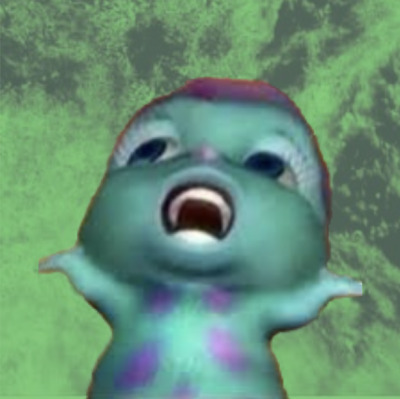
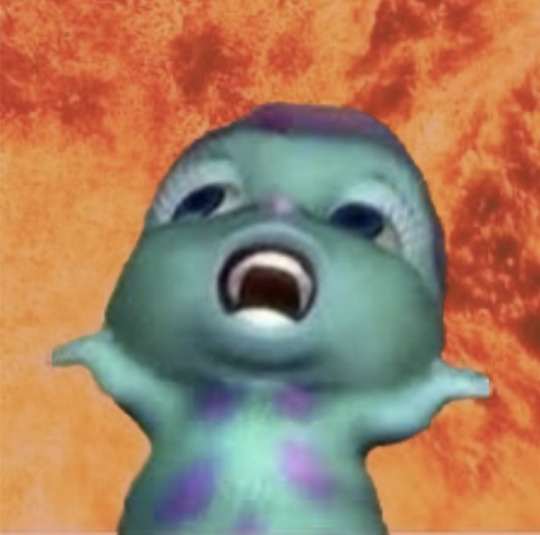

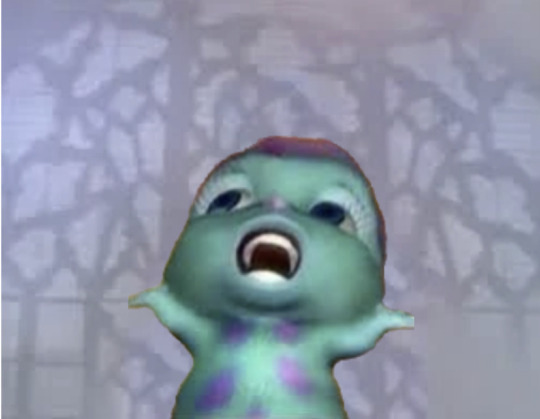
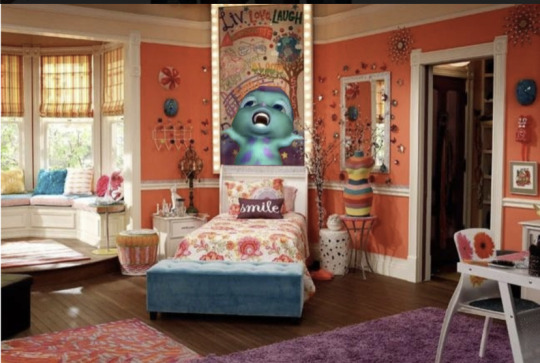

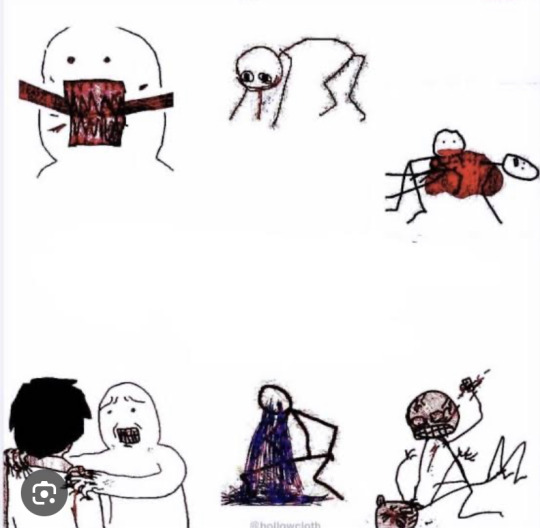
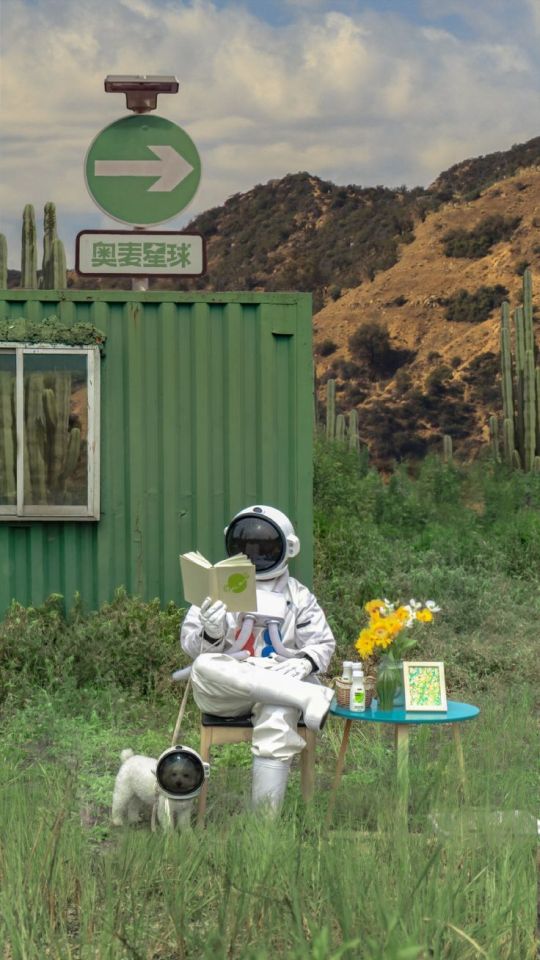

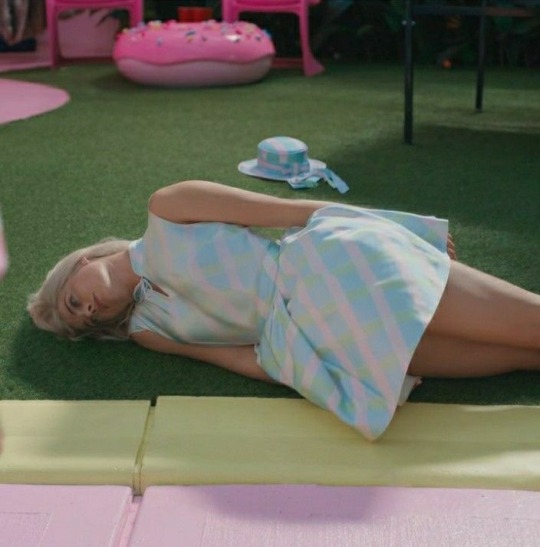

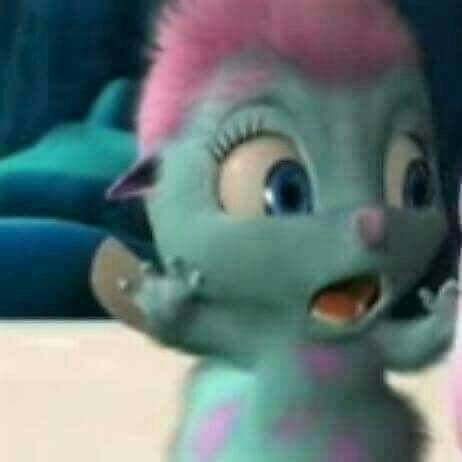



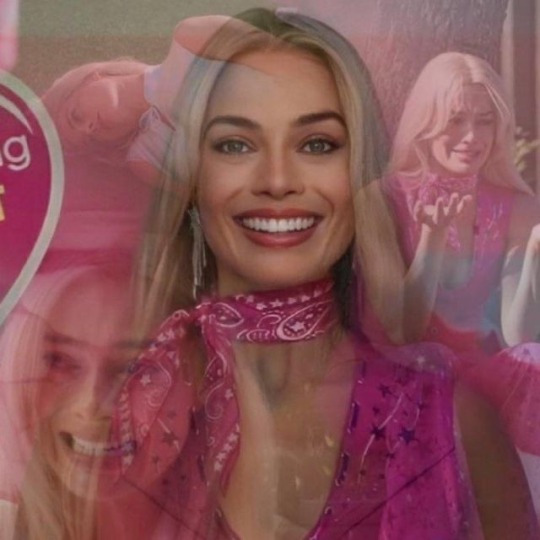

↳ personal tags i want to save : my reblogs of tumblr hall of fame posts (2) | i love you | save for later!! | rambles in shambles | long posts | my (unserious) edits | 💌 | ✉ | tagged (2) | album releases edition : sntv rants ✧ guts some incoherent thoughts ✧ 1989 tv know places we can hide
↳ some of my sideblogs : @electrictouchftvtv -> used to be a random writing blog, but got shadowbanned. @andillwatchh -> movies & shows sideblog @iborrowlibrarybooks -> i don’t know, book quotes / moodboards / aesthetic blog? haven’t used it in a while. @everlarkestt -> supposed to be a thg sideblog but it’s currently empty except like two posts because i’m lazy. @labyrintharchive -> I WANT TO BE LOVED. I CARE MORE TO BE LOVED.
#check down below for some v cool moodboard btw 😁👍#nadine.mp3#intro post#nadirants#also i haven't finished making that moodboard hold ON
97 notes
·
View notes
Text
You asked if I was feeling it, I’m psycho high
Know you won’t remember in the morning when I speak my mind
Lights are on and they’ve gone home, but who am I?
Oh fast the evening passes, cleaning up the champagne glasses
Six years since Melodrama. I spent a lot of cold nights in Sydney, and later Tokyo and New York, listening to this album on repeat trying to make sense of the relentless aching in my chest and how fast everything felt in my head.
Every single day I think about the year 2017 and my 23 year old self. More than any other year and any other age. The day my first relationship ended. The many, many doctor, psychologist and psychiatrist visits throughout the year. The night I started taking antipsychotics, and the several days after that. The guy I was seeing as a distraction from it all, who will never know that he was the one who put the idea in my head to travel to Japan, a trip which at the very least saved my last shred of sanity and at the very most saved my life. 23rd December 2017 and sitting in the onsen in Hakone and finally feeling like I really could do the things I thought I couldn’t do.
The painful and necessary experience of your prefrontal cortex’s final growth spurt, and Melodrama as the soundtrack.
1 note
·
View note
Text
I am my mother's child, I'll love you 'til my breathing stops I'll love you 'til you call the cops on me
1 note
·
View note
Photo

Best Of 2017
#lorde#melodrama#album#royals#pure#heroine#heroin#2017#saved#female#singer#pop#alternative#music#fan#made#art#work#cover#queen
2 notes
·
View notes
Text
In case you didn’t know I really love Melodrama (2017) by Lorde
#its a work of art#the lyrics are mindblowing#lorde is truly a genius#and they’re bops you can dance your ass of to#melodrama & reputation really did save 2017
2 notes
·
View notes
Text
there’s like a 98% chance there’s not gonna be any new lorde music this year so i may as well just die
#i mean the only thing that saved 2017 really#i swear to god if i have to wait another what#4 years#until the next album#its tragic honestly#whats the point#lorde#melodrama#pure heroine#music
1 note
·
View note
Text
Continued MSM 2017 watch comments: Wait, Season 2 is actually GOOD in places? That's not what I started watching this show for.
Long spoiler-y rambles abut this bit under the cut on Venom Returns & Bring On the Bad Guys.
S2E7 (Venom Returns)
This is part two of a two-parter I forgot I was watching. Hi, Eddie Brock. Random notes:
I got a laugh out of Gwen yelling "MY DAD'S A COP!" in response to a weird noise in her house at night. That's 616 in-character.
On this episode of Stupid Tech: Eddie Brock's hacks into his own laptop remotely(?) to show a live feed from a nonexistent camera because he knows people are looking at it at that exact moment.
The bit with Brock and the taxicab is totally ripped from SM3.
Miles playing Spider-Man to save Peter from an unmasking is a fun and slightly more sensical take on Hobie doing the same!
WHAT is up with the animation bump when the spacegun goes off. I think I gasped, it looks like it came from a different show, and then it goes right back to the mediocre standard style afterwards. That little sequence was almost enough to convince me this episode was good, or something.
S2E8-11 (Bring on the Bad Guys)
S2 is SO much more Spidey at this point. He's now broke, stressed, busy, widely reviled, tempermental, and up against total goofy weirdos! They even use some comics gags I think are cute! Wild contrast to S1's Voltron-esque genius-school melodrama.
This arc is probably my unironic favorite so far. Feels so pleasingly serial hero comic-y: throwing goofy villains of the week at dear Spider-Man, every one fun and unique, for smaller stakes hinting towards an eventual large stakes plot. There are so many, so let's go down the list:
Hippo & Pandamania: I was instantly endeared to these two. They're from outta town!
Overdrive: Very TRON? I don't know much about this guy.
The Spot: Just kind of a warmup fight, but a creative one. Leading to our feature presentation...
MYSTERIO! LOVE this sequence. One, THE BLACK LODGE??? Two, I feel like Spidey losing to himself at rock paper scissors in a mirror is something that would happen in the 60s show and then get gif'd to hell and back as a meme.
Jack O' Lantern!! Good god I love a tacky Halloween themed troublemaker that wants to kill you for real!
Prowler: I correctly guessed who this was despite the fact that they boringed Hobie's costume. Loved his character, motivations, and dynamic with Spidey though.
Electro: This might be my favorite Electro human form, even if the fight that follows pales in comparison to the crazy stunts we've just had.
Chameleon: This fight gets points off for not having Chameleon masquerade as Peter, but that's about it.
Other notes--
IDK much about Anja, but she's here, keeping a low profile. Spidey's not great at team-ups, but this show tends to overdo the hero team-ups a tad IMO.
Earlier episodes' "random melodramatic slow-mo" is now more clearly communicated as Spider-Sense, so I like it now.
Peter keeps using super fancy imaging tech in his mask and despite very other part of the Parker Makeover this still bothers me.
Ew, the MCU "Spidey sucks up to the Avengers" trope. Acceptable because I saw the fakeout coming a mile away.
I'm going to be sad if the show falls back into its old ways after that sequence of nonstop good clean Spider-Man fun.
12 notes
·
View notes
Text
My 20 Best Korean Drama
1. Hi Bye Mama
Genre: Fantasy, Drama
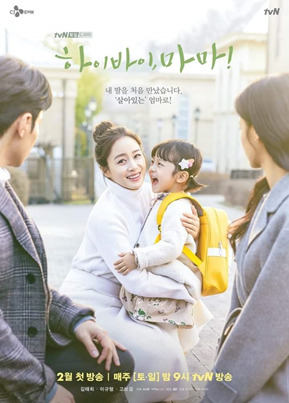
Plot:
Cha Yu-Ri (Kim Tae Hee) has been a ghost since she died 5 years ago. She left behind her husband Jo Kang-Hwa and their child. To become a human again, Cha Yu-Ri carries out a reincarnation project for 49 days.
Meanwhile, Jo Kang-Hwa (Lee Kyu-Hyung) works as a chest surgeon. He was loving, but, after his wife died, his personality changed. After 5 years, his wife Cha Yu-Ri reappears in front of him.
2. It’s Okay to Not be Okay
Genre: Romance, Drama
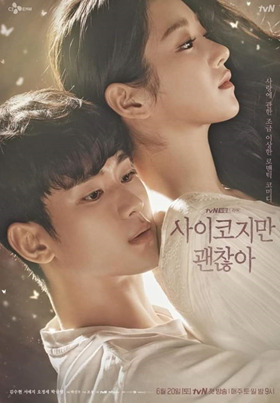
Plot:
A story about a man employed in a psychiatric ward and a woman, with an antisocial personality disorder, who is a popular writer of children’s books.
Moon Kang-Tae (Kim Soo-Hyun) works in a psychiatric ward. His job is to write down the patients’ conditions and deal with unexpected situations, like if patients fight or they run away. He only earns about 1.8 million won ($1,600 USD) a month. The woman (Seo Yea-Ji) is a popular writer of children’s literature, but she is extremely selfish, arrogant and rude.
3. Angel’s last Mission
Genre: Romance, Fantasy

Plot:
Kim Dan (Kim Myung-Soo) is an angel. He is also a troublemaker and also optimist. Lee Yeon-Seo (Shin Hye-Sun) is a ballerina who does not believe in lve.
Dan then receives a mission. If he succeeds, he can return to Heaven. His mission is to find true love for Yeon-Seo, but soon falls in love with her.
4. Prison Playbook
Genre: Black Comedy

Plot:
Je-Hyeok (Park Hae-Soo) is the best relief pitcher in Korea. He will to the U.S and sign a contract with a major league. One night, he hears his sister screaming and sees a man running out of her apartment. Je-hyeok and the man get into a physical struggle with Je-Hyeok striking the man with a rock. Later, Je-Hyeok receives a 1 year prison sentence for using excessive force. Devastated, Je-Hyeok must adapt to life in prison.
Meanwhile, Joon-Ho (Jung Kyoung-Ho) is a friend of Je-Hyeok and works in the prisonas an officer. He waits for Je-Hyeok’s arrival.
5. Chicago Typewriter
Genre: Romance, Fantasy, Friendship

Plot:
This drama follows the lives of two men and a woman through two eras; one during the 1930s Japanese occupation of Korea and the other in the 21st century. Han Se-Joo (Yoo Ah-In) who was a writer in his past life and a bestselling author in the present. But Se-Joo is depressed with writer’s block so he can’t write his next book.
Yu Jin-Oh (Go Kyung-Pyo) owned a bar in his previous life. In 2017 he is a talented ghostwriter who can bail Se-Joo out of his predicament, but the mysterious man has a condition for his services. Se-Joo may not be able to meet it.
Jun Seol (Im Soo Jung) was a sniper. Now she has extremely variety expertise. She is a former Olympian hopeful, a veterinarian and a book lover who runs her own delivery service. She oscillates between extreme fandom and an anti-fan of Se Joo.
The intricately woven story of these three characters unfolds to reveal strange mirroring connections between the time periods as well as possibilities for past lives to be redeemed or improves in the modern world.
6. Uncontrollably Fond
Genre: Romance, Melodrama
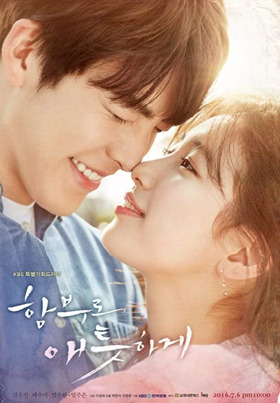
Plot:
Sin Joon-Young (Kim Woo-Bin) and No Eul (Bae Suzy) were in love in ther younger days. But uncontrollable circumstances separated them and they went their separate ways. Joon-Young is now a superstar actor and singer, while No Eul became a producer-director of documentaries. When their path cross again years later. Joon-Young discovers that No Eul is now very different person than he remembered – materialisticand willing to do anything to get ahead.
7. Penthouse: War In Life
Genre: Suspense, Life, Drama, Family, Mature
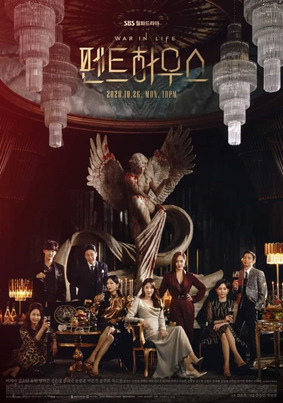
Plot:
The residents of Hera Palace, a luxury penthouse apartment with 100 floors, have many secrets and hidden ambitions. Sim Su-Ryeon (Lee Ji-Ah), who was born into wealth, is the queen of the penthouse apartment. Cheon Seo-Jin (Kim So-Yeon), the prima donna of the residence, does all she can to give everything to her daughter. Oh Yoon-Hee (Eugene) comes from a poor family background, but she strives to enter high society by becoming the queen of the penthouse, the pinnacle success in her eyes. A battle for wealth, power, and prestige at Seoul’s most coveted penthouse begins.
8. Crash Landing On You
Genre: Romance, Comedy, Military, Political

Plot:
Yoon Se-Ri (Son Ye-Ji) is an heiress to a conglomerate in South Korea. One day, while paragliding, an accident caused by strong winds leads Yoon Se-Ri to make an emergency landing in North Korea. There, she meets Ri Jeong-Hyeok (Hyun-Bin), who is a North Korean army officer. He tries to protect her and hide her. Soon, Ri Jeong-Hyeok falls in love with Yoon Se-RI.
9. Itaewon Class
Genre: Romance, Business, Friendship, Life
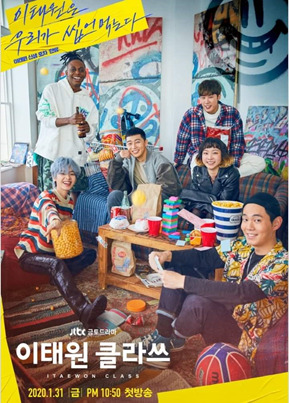
Plot:
On the first day of attending his new high school, Park Sae-Ro-Yi (Park Seo-Joon) punches his classmate Jang Geun-Won, who was bullying another classmate. The bully is the son of CEO Jang Dae-Hee (Yoo Jae-Myung). The bully's father runs restaurant business Jagga where Park Sae-Ro-Yi’s own father works. CEO Jang Dae-Hee demands to Park Sae-Ro-Yi that he apologizes to his son, but Park Sae-Ro-Yi refuses. Because of his refusal, Park Sae-Ro-Yi gets expelled from school and his father gets fired from his job. Soon, an accident takes place. Park Sae-Ro-Yi’s father dies in a motorcycle accident caused by his ex-classmate Jang Geun-Won. Burning with anger, Park Sae-Ro-Yi viciously beats Jang Geun-Won. He is soon arrested and receives prison time for the violent assault. Park Sae-Ro-Yi decides to destroy the Jagga company and take revenge upon CEO Jang Dae-Hee and his son Jang Geun-Won. Once Park Sae-Ro-Yi is released from prison, he opens a restaurant in Itaewon, Seoul. Jo Yi-Seo (Kim Da-Mi), who is popular on social media, joins Park Sae-Ro-Yi’s restaurant and works there as a manger. She has feelings for Park Sae-Ro-Yi.
10. Hotel De Luna
Genre: Romance, Comedy, Horror, Fantasy
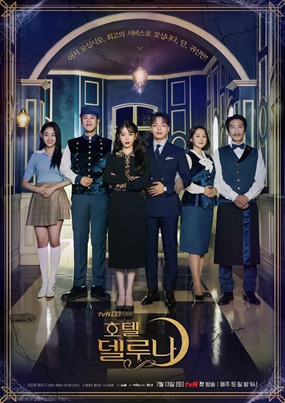
Plot:
Jang Man-Wol (IU) is the CEO of Hotel del Luna. The hotel is situated in downtown in Seoul and has a very old appearance. She made a big error many years ago and, because of this, she has been stuck at Hotel del Luna. She is beautiful, but she is fickle, suspicious and greedy.
Koo Chan-Sung (Yeo Jin-Goo) worked as the youngest assistant manager ever at a multinational hotel corporation. He is a sincere perfectionist. He looks level-headed, but he actually has a soft disposition. Due to an unexpected case, he begins to work as a manager at Hotel del Luna. The hotel's clientele consists of ghosts.
11. Do Do Sol Sol La La Sol
Genre: Romance, Comedy

Plot:
Goo Ra-Ra (Go Ara) is a pianist. She has bright personality. Something happened that caused her to become bankrupt. She doesn't have anything now and she is frustrated with her situation.
Sunwoo Joon (Lee Jae-Wook) doesn't care what other people think about him, but he has a warm heart. He is free spirited and doesn't have a specific dream or goal for his life. He makes ends meet by working part-time jobs.
Goo Ra-Ra and Sunwoo Joon meet at the small private piano academy LaLa Land in a country village.
12. 18 Again
Genre: Romance, Comedy, Youth, Drama, Fantasy
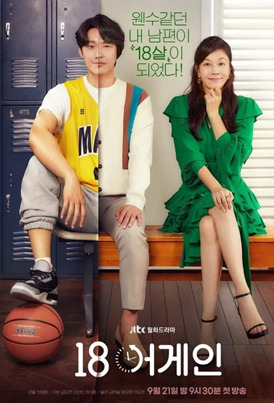
Plot:
Tells the story of a husband named Hong Dae Young (Lee Do-Hyun) who is on the verge of divorce but finds himself back in his body when he was at the prime of his life 18 years ago. He ends up changing his name to Go Woo Young when he becomes 18- years-old again. Meanwhile, his wife Jung Da Jung(Kim Ha-Neul) joins the workforce as an anchorwoman later on in life after raising their 18-year-old twins.
13. Goblin: The Lonely and Great God
Genre: Comedy, Romance, Fantasy
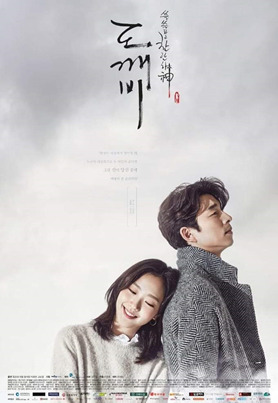
Plot:
In ancient times, Kim Shin (Gong Yoo) is an unbeatable general in wars, but the young King (Kim Min-Jae) is jealous of Kim Shin and kills him. Kim Shin becomes Dokkaebi (Goblin), possessing an immortal life. At first he thinks that he is blessed, but he realizes that he is cursed.
Closer to the present day, Kim Shin has waited 900 years for a human bride to end his immortal life. One night, he saves a dying pregnant woman (Park Hee-Von) who is destined to die. Meanwhile, the Grim Reaper (Lee Dong-Wook) is unable to find the dead pregnant woman. The woman gives birth to a baby girl named Ji Eun-Tak (later played by Kim Go-Eun). 9 years later, Ji Eun-Tak lives with her mother and is able to see ghosts. One night, her mother suddenly dies. On that night, she meets the Grim Reaper.
In the present day, Ji Eun-Tak is a high school student. She still sees ghosts and hears their whisper of “Dokkaebi’s bride.” She now lives with her aunt’s family, but she is mistreated by them. On her birthday, Ji Eun-Tak sits by the sea with a lighted birthday cake. At that time, Kim Shin suddenly appears in front of her. Kim Shin does not know why, but he can hear her voice and appears in front of her against his will. Coincidentally, Kim Shin lives with the Grim Reaper at the same house.
Now, Kim Shin appears in front of her against his will, whenever she turns off the lights. One day, Ji Eun-Tak tells him that he is Dokkaebi and she is his bride.
14. It’s Okay That’s Love
Genre: Friendship, Psychological, Comedy, Romance, Drama

Plot:
Jang Jae-Yeol (Jo In-Sung) is a mystery writer and radio DJ. He suffers from a obsession. Ji Hae-Soo (Gong Hyo-Jin) is going through her first year fellowship in psychiatry at a University Hospital. She chose psychiatry because she doesn't want to perform surgeries. After she meets Jang Jae-Yeol, her life goes through big changes.
15. Let’s Fight Ghost
Genre: Romance, Comedy, Fantasy, Action, Horror

Plot:
Hyun-Ji (Kim So-Hyun) studied for most her life before she died at the age of 19. She is now a ghost and has wandered around the world for several years. Hyun-Ji then meets exorcist Park Bong-Pal (TaecYeon). Hyun-Ji and Bong-Pal listens to various stories from ghosts and sends them to the otherworld.
16. Hospital Playlist
Genre: Friendship, Comedy, Romance, Life, Medical
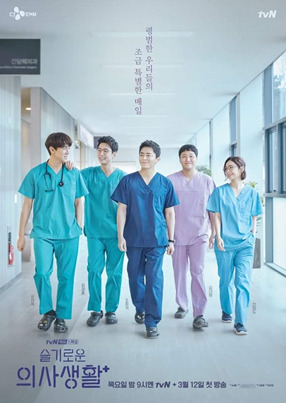
Plot:
A drama depicting the stories of people going through their days that are seemingly ordinary but actually special, at the hospital, a place known as the microcosm of life - where someone is being born and someone's life meets their ending. The five doctors are longtime friends of 20 years who started their undergrad in 1999 in the same medical school, and now they are colleagues in the same hospital. The drama will also deal with a story of a band formed by the group of doctors.
17. Fated to Loved You
Genre: Business, Comedy, Romance,
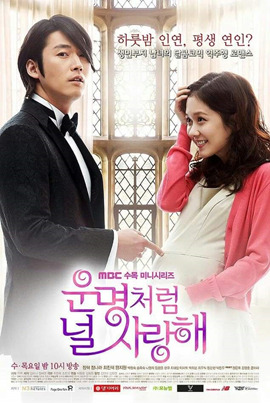
Plot:
This drama is the story of an ordinary girl, Mi Yeong, (Jang Na-Ra)who has neither outstanding looks, a prestigious college degree, nor any other charming qualities, facing her whole life abruptly changing when love comes knocking at her door. While on vacation, she accidentally happens to spend one night with Lee Gun (Jang Hyuk) and even gets pregnant from that night. Because of this incident, her life will never be the same, and this fateful encounter brings love that transforms this not-so-special girl to an attractive, charming lady.
18. Go Back Couple
Genre: Comedy, Romance, Life, Fantasy
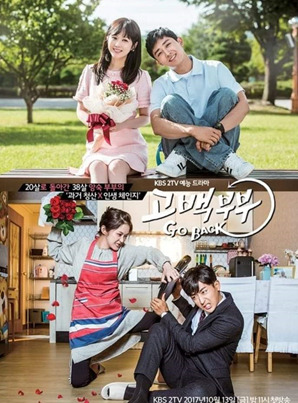
Plot:
Choi Ban-Do (Son Ho-Jun) and Ma Jin-Joo (Jang Na-Ra) are both 38-years-old and a married couple. Choi Ban-Do has been burdened with being the breadwinner and Ma Jin-Joo is a housewife with low self-esteem. Even though they loved each other when they married, they now hate each other. They both regret marrying at such a young age. The couple travel through time and find themselves as 20-year-old university students, when they met for the first time.
19. To The Beautiful You
Genre: School, Teen, Romantic, Comedy, Sports
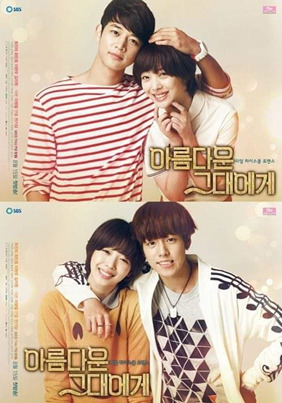
Plot:
Kang Tae-Joon (Minho) is a gold medalist in the high jump, but he has been mired in a slump due to an injury. In order to help her idol, a girl named Koo Jae-Hee (Sulli) disguises herself as a boy and enrolls at the same all male high school.When Tae-Joon (Minho) is competiting at the World Junior Competition, Jae-Hee (Sulli) watches him on TV in America and becomes very touched.
Despite her friends telling her otherwise, Jae-Hee cuts her long hair by herself. She then flies to South Korea, with a plan to stay with Tae-Joon who is now injured. Jae-Hee disguises herself as a boy and enrolls at the all boys Genie Physical Education High School. On her first day at school, Jae-Hee goes up the stairs with her suitcase, but her suitcase bursts open and all her clothes fall out. A boy comes by and helps her pick up her stuff. Jae-Hee realizes that the boy helping her is none other than her idol Tae-Joon. In her excitement, Jae-Hee sits on her suitcase, which proceeds to slide down the stairs.
20. When the Camellia Blooms
Genre: Triller, Comedy, Romance, Family

Plot:
Dong-Baek (Kong Hyo-Jin) is a single mother living in the small town of Ongsan. She runs the bar-restaurant Camellia, while also taking care of her son Pil-Gu (Kim Kang-Hoon). The people of Ongsan frequently gossip about Dong-Baek. She grew up as an orphan, is a single mother and runs a bar where many of the men in Ongsan frequent. Regardless of what the locals may whisper about Dong-Baek, local police officer Hwang Yong-Sik (Kang Ha-Neul) is deeply in love with her. Meanwhile, Dong-Baek's ex-boyfriend Kang Jong-Ryeol (Kim Ji-Suk) suddenly reappears in her life. He is a famous baseball player, that hid their relationship when they dated. While Dong-Baek tries to find happiness, something truly sinister lurks in the background. A serial killer roams Ongsan and Dong-Baek may be a target.
75 notes
·
View notes
Text
Central to the American Dream and to justifying the simultaneous genocide of humans and other-than-humans in the so-called Americas is the "animacy hierarchy" that places some beings below others. Strictly speaking, the ideas of being animate and inanimate posit categorical divides between entities -- those seen to be alive and those deemed as not living, a divide defined organismically in dominant thinking. But Mel Chen, in the book Animacies, explains dominant cultural ideas that point to more gradation around greater and lesser relative degrees of sentience, aliveness, (self-)awareness, and agency among different entities. This hierarchy is actualized through the associated verbs/adjectives "animate" and de-animate" that refer to the greater and lesser aliveness attributed to humans over other-than-humans, to animals over plants, etc. [...]
In rejecting the binaries of life versus not life and humans versus nature, as well as other more graduated Eurocentric hierarchies of life, I foreground an everyday Dakota understanding of existence that focuses on "being in good relation." [...] Thinking in terms of being in relation, I propose an explicitly spatial narrative of caretaking relations-both human and other-than-human-as an alternative to the temporally progressive settler-colonial American Dreaming that is ever co-constituted with deadly hierarchies of life. [...] It is a narrative that can help us resist those dreams of progress toward a never-arriving future of tolerance and good that paradoxically requires ongoing genocidal and anti-Black violence, as well as violence toward many de-animated bodies.
The path toward the supposed democratic promised land of settler mythology is in everyday life a nightmare for many around the globe. American democracy not only "dies in darkness."
It is ever formed of hierarchical violence.
-------
In February 2017, the Washington Post began regularly using on its website a new slogan, "Democracy dies in darkness." What melodrama for a capitol newspaper of a nation born of and sustained by genocidal "darkness" at home and overseas! One presumes the cherry-picked tragedy that prompted the slogan was none other than the presidential election of [2016]. But it is not only explicit white supremacists emboldened by [the US president], nineteenth-century Indian killers, or today's CEOs at the helm of resource-extraction companies who have accepted Indigenous elimination as the collateral damage of settler-state development. [...]
While the foundation of Indigenous elimination is one of white supremacy, it is not only white people in power who work to eliminate or erase Indigenous peoples. Dreaming, even in inclusive and multicultural tones, of developing an ideal settler state implicitly supports the elimination of Indigenous peoples from this place.
Scientists, technology developers, and environmental and social policymakers support alternately extracting or "stewarding" natural and human resources toward the goal of maintaining privilege in the United States and other settler states such as Canada. This has worked to eliminate Indigenous peoples, either explicitly or implicitly, as we and the remains of our ancestors continue to be removed from traditional homelands for both purposes. Whether the settler state wants to farm, build a mine or a city, pump oil, or cordon off a national park, the "resources" used to build these nation-states include the lands, waters, and other-than-human beings with whom Indigenous peoples are co-constituted.
-------
We require another narrative path to help us abandon the American Dream.
In The White Possessive: Property, Power, and Indigenous Sovereignty, Aileen Moreton-Robinson clarifies the irrevocable link between the maintenance of the US state and ongoing Indigenous elimination [...]. Yet Indigenous erasure is pervasive even in critical accounts of US empire, as Moreton-Robinson points out. Even progressive thinkers who otherwise link race, nation, class, immigration, and global capitalism fail to include Indigeneity within their analyses. [...] Thus, even progressive national narratives imply that Indigenous peoples are inevitably vanishing, which does not square with Indigenous peoples' own will to self-determination, our resistance to state assimilation [...].
-------
The settler state cannot be decolonized. [...] Losing hope in the state redeeming itself is for me a move toward what Junot Díaz calls "radical hope."
Some may think that the twenty-first-century state has moved beyond coercive tactics that constructed nonwhites as "others" to be either killed or assimilated. We hear so much talk of diversity and inclusion. [...]
In order to sustain good relations among all the beings that inhabit these lands, we must undercut settler (property) relations. Instead of killing the Indian to save the man, we must turn the ontological table. [...]
Or as my Indigenous studies colleague and Lakota relative Nick Estes put it in an email to me, we must commit "settler ontocide." [...]
This distinction is so obvious to Indigenous thinkers and the Black decolonial scholars we also cite, but as Menominee scholar Enaemaehkiw Kesîqnaeh writes, the settler has "a deeply ingrained fear that in the revolution all that they have done will be visited back upon them by the global majority with great ferocity."
How lacking in imagination and radical hope is the settler and his state.
-------
Kim TallBear. “Caretaking Relations, Not American Dreaming.” Kalfou. Spring 2019.
86 notes
·
View notes
Text
Reviewing My Top 40 Most-Played Songs: January 1 - July 2, 2021 (Part 1 of 5, #40-#33 & #16)
40. “Chesapeake” by Better Oblivion Community Center (2019)
“Even though there’s no one around
You broke a leg and the house came down....”
I’ve listened to this whole album A Lot these past few months. It’s good music, better lyricism, and superlative acting. I’m always impressed by a concept album that doesn’t market itself as such, and this....is that. I might be just a bit biased as someone who was already a pretty big fan of both Phoebe Bridgers and Connor Oberst, but the fact that their first collaborative effort as BOCC manages to match or exceed most of their individual works speaks well of their “stage chemistry”, so to speak. While I shan’t to speculate on the private lives of the performers, I will go so far as to say that Bridgers’ and Oberst’s portrayals of their respective characters on this album is engaging and compelling storytelling with a remarkable level of pathos and verisimilitude. And I mean they really sell it - I don’t think it’s overstating this album’s case to compare it to the Mountain Goats’ Tallahassee (2002) or Stars’ Set Yourself on Fire (2004) in terms of its synthesis of deeply humanistic romance-cum-psychodrama and witty, listenable indie-pop. This track especially stands out as an authentic and heartwarming/heartwrenching number about the way the distance between us and those we hold most dear can shift at a moment’s notice, with Phoebe Bridgers’ vocal performance especially standing out as one of the most authentically emotional in her catalogue.
39. “Televangelist” by Julien Baker (2017)
“Am I a masochist, screaming televangelist?
Clutching my crucifix of white noise and static,
All my prayers are just apologies....
Hold out a flare, ‘til you come for me....
Do I turn into light if I burn alive?”
When I first heard the above passage, the song’s final chorus, I’m pretty sure I immediately rewound the track just so I could confirm what I had just heard. has already been said by many critics, Julien Baker is a really good lyricist. This song’s portrayal of the angst associated with finding and questioning faith, trying to perform and trying not to, and interrogating the relationship between the factions of oneself that are one’s body, mind, and soul is....strikingly raw even in plaintext, and made all the more powerful by Baker’s impassioned line delivery and the track’s sparse musical arrangement. It’s rare that a song has an impact on me that is so immediate and so lasting. My personal feelings about the song notwithstanding, I think there’s something to be said for this particular number’s universalising character, also. Who among us hasn’t interrogated their own desires and motivations, as Baker’s narrator does here? And more to the point, who among us hasn’t done that again after hearing this song?
38. “The Bagman’s Gambit” by The Decemberists (2005)
“And from my ten-floor tenement, where once our bodies lay
How I long to hear you say,
‘No, they’ll never catch me now....
No they’ll never catch me....
No they cannot catch me now.’”
This song is over 16 years old now, but it’s a song I’ve only come to fully appreciate this year. I have mixed feelings about The Decemberists’ discography as a whole - often, I think, Colin Meloy is a bit too clever for his band’s own good, and his band is too damn good for some of his lyrics. That said, this song is a masterclass in lyrical storytelling - explicating only what the narrator needs to say, and implying just enough for the listener to infer what the narrator hasn’t the wherewithal to say. That, combined with the number’s Neutral Milk Hotel-esque bridge, its anti-folk aesthetic, and the sincerity with which Meloy portrays the lovesick, doomed, and (presumably) closeted Cold War-era DC beaurocrat, combine to make a song that I feel entirely comfortable calling the band’s magnum opus. If you haven’t heard it in a while, I recommend giving it another spin; it holds up just fine.
37. “Guitar Hero” by Amanda Palmer (2008)
“So what’s the use of going outside?
It’s so depressing when people die in real life.
I’d rather pick up right where we left,
Making out to Faces of Death...”
Alright. I’m not going to comment on the authorial intent behind this song and its subject matter, nor am I going to try to defend some of the language Palmer uses in its lyrics. I am Well Aware that my fave is problematic. But this is the song that gave us the line, “And I could save you, baby, but it isn’t worth my time,” which, frankly, is enough to make it a gem in my book. All of my comments here are based on my initial experience of a given song and the reasons I spent so much time listening to it. When I first heard this song, I heard it as a commentary on a dysfunctional-but-addictive relationship and the comparable destrudo-ific lure of rockstardom. And as far as that interpretation goes? It’s right effective. If you ask me.
#36 & #16 “Chinese Satellite” by Phoebe Bridgers & “Chinese Satellite (Copycat Killer Version) by Phoebe Bridgers and Rob Moose (2020)
“...but you know I’d stand on a corner, embarrassed, with a picket sign
If it meant I would see you when I die.
Sometimes, when I can’t sleep
It’s just a matter of time before I’m hearing things;
Swore I could hear you, through the walls...
But that’s impossible.)”
It’s hard for me to talk about this song, which is something of a comment on how much it’s influenced me. The number of mornings I’ve spent “walking around in circles” to this song is more than I could count. An awful lot has been said about Phoebe Bridgers and her songwriting in this past year, so it’s hard for me to say anything here that’s not already been said, but with regard to this song in particular, I’d like to point out the way the narrator ambiguates the nature of their loneliness by proceeding the line “...you know how I hate to be alone.” with “I want to believe; but then, I look at the sky and I feel nothing...”, suggesting a spiritual element to a song, which element is later reinforced by both the above quotation “...but you know I’d stand on a corner....) and references to the narrator’s subject having been “...screaming at the evangelicals”. These touches, along with the urgency with which Bridgers portrays the simple vignette of her narrator “walking around in circles, pretending to be [her]self”, make for a pop song that’s both catchy enough to hum along to, and thought-provoking enough to make a listener pause in mid-stride.
#35. “Plea” by Say Anything (ft. Kenny Vasoli and Hayley Williams) (2007)
“If you should go, right now (I slit this cut in the black, expanding sky...)
If you should go, right now (The rain bleeds out, before my jaded eyes...)
If you should go, right now (I slit this cut in the black, expanding sky...)
To live without your love....
I don’t know how.”
“Plea” is remarkably lacking in lyrical density, relative to both In Defense of the Genre (the album from whence it came) and to Max Bemis’ body of work in general. This isn’t a bad thing - its simplicity (along with the fact that it features two of aughties pop-punk’s superluminaries on top of Bemis’ own singing and songwriting) makes it stand out on the album as a deeply human longing, and, well....a plea. When Hayley Williams sings, “Make me believe you mean this!” over Bemis’ plaintive bridge-cum-”prayer”, the listener is compelled to follow along - to not only suspend one’s disbelief with regard to the content of the song, but to believe in the sincerity of the song and its creators. It’s easy and myopic to read of Bemis and his band’s work as pretentious or affected, but songs like “Plea” debunk this notion easily, by displaying a level of candour and vulnerability that is all-too-rare in The Genre At Large.
#34. “137″ by Brand New (2017)
“Before the Garden, when you were all alone,
You made the atom.
Was that some inside joke?
Open the gates, and then conceal the path,
‘Let’s load the gun and see how long they last.’?”
There was a period of about two between my discovering this song, in the first half of 2018, and my writing this today, during which I couldn’t listen to this song at all. Setting aside the complicated relationship many (current and former) fans of Brand New have with Jesse Lacey’s body of work, this song is heavy enough to discourage frequent or casual listening in its own right, as its narrator comes to terms with the impending end of their life (and everyone else’s) in an apocalyptic nuclear war. It’s grim, and unlike much of Lacey’s lyricism, it contains little in the way of comic relief, romantic sentimentality, or typical Third-Wave-Emo melodrama. Instead, its narrator’s sardonic, singsong meditations reverberate against guitar riffs that repeat their melody through a glass, darkly, and garbled fragments of radio or telephonic messages (ostensibly from the narrator or others in his situation). It’s by no means easy listening, and it could be argued that it’s too “grimdark” for its own good, but even so, it’s a triumph of modern rock that manages to stand out even amidst so many similarly distinctive cuts from Science Fiction.
#33. “Dark in Here” by the Mountain Goats (2021)
“Did you leave your house in order, when you came for me?
Is this really where you meant to be?
Just beyond your limits, find a new frontier;
I live in the darkness.
It’s dark in here.”
Not since 2015′s “Werewolf Gimmick” has John Darnielle portrayed so effectively so intimidating a narrator. As the Mountain Goats have surged in popularity lately (especially here on tumblr), there’s been a proportionate surge of critics calling John Darnielle’s songwriting “predictable”,and there is some truth to that allegation. However, I would argue that in the context of the Mountain Goats’ oeuvre as a whole, their consistency in form is more of a strength than a weakness, especially given the diversity of subjects about whom (or from whose perspective) Darnielle chooses to write. In “Dark in Here” (the title track of what is at time of writing their most recent album), Darnielle portrays an eternally headstrong fugitive, renegade, or partisan, hunkering down amidst a stockpile of ammunition in preparation for a last stand against his pursuers. Another artist might’ve delivered the song’s bitter jabs and desperate threats with more aggression, but JD’s increasingly measured and uncharacteristically stable intonation on this track lend the lyrics an aura of menace without which the listener mightn’’t have found them credible. “Dark in Here”, undoubtedly, sounds like a Mountain Goats song. That’s not a bad thing.
#music review#song review#better oblivion community center#julien baker#the decemberists#amanda palmer#phoebe bridgers#say anything#the mountain goats
9 notes
·
View notes
Text

I posted 114 times in 2021
57 posts created (50%)
57 posts reblogged (50%)
For every post I created, I reblogged 1.0 posts.
I added 170 tags in 2021
#lcpl recs - 55 posts
#queue-y decimal - 17 posts
#fact check friday - 15 posts
#book review - 13 posts
#media literacy - 13 posts
#lgbtq reads - 12 posts
#disinformation - 12 posts
#chris's recs - 11 posts
#misinformation - 11 posts
#recommended reading - 11 posts
Longest Tag: 136 characters
#because if you read for an hour and only manage two pages you are just as valid as someone who reads for an hour and covers 200 pages <3
My Top Posts in 2021
#5
Fact Check Friday #18
Welcome back to Fact Check Friday! Our series of bite-sized media literacy tips is almost over. We hope you’ve found it useful! Remember you can review all the tips any time.
For now, here’s tip 18! (Image text repeated below for people on mobile and using screen readers.)

Is that post Photoshopped?
It is extremely easy to generate fake posts for most social media using free online tools.
This took me five minutes, and I wasn’t even trying very hard:
See the full post
41 notes • Posted 2021-04-02 13:01:23 GMT
#4

Happy Pride! This year's 5 Fav LGBTQ+ Reads post is brought to you by the hour I just spent trying to find a rainbow background that worked for both Gideon the Ninth and One Last Stop -_- (Go ahead and picture Gideon surrounded by rainbow shoujo bubbles. I'll wait.)
Anyway, here are the best LGBTQ+ books I read in the last 12 months!
(Here are past years' picks: 2020, 2019, 2018, 2017)
One Last Stop by Casey McQuiston (lesbian, bi rep)
A meet-cute on the subway turns into something more (like, not only relationship-wise but also "let's solve a time travel mystery"-wise.)
Swordspoint by @ellenkushner (bi rep)
Published in 1987, this one is a "melodrama of manners" (aka lots of dueling and politics) with a m/m main relationship. Highly recommend getting an edition that includes bonus short stories, because you'll want more when you get to the end.
Across the Green Grass Fields by @seananmcguire (intersex rep)
A study in good character-driven writing about a girl who goes through a mysterious door and finds herself expected to be the Hooflands' next hero. (You could read this one without reading the previous installments in the series... but why would you want to deprive yourself of that?)
Gideon the Ninth by @tazmuir (lesbian rep)
Lesbian. Necromancers. In. Space.
The City We Became by N.K. Jemisin (lesbian, bi, gay rep)
Each of New York's boroughs is incarnated in one of its residents as the city comes under attack by... something not from around here. It's N.K. Jemisin, so hold on to your butts.
See more of Robin's recs
68 notes • Posted 2021-06-18 12:20:28 GMT
#3
Move over, Stephen King. Make room for these diverse authors of horror.
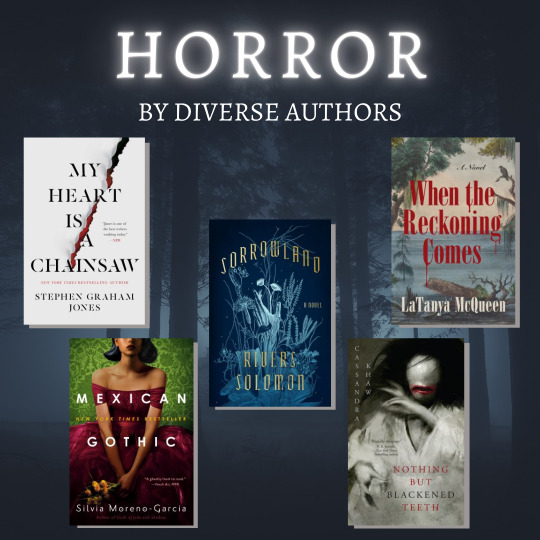
My Heart is a Chainsaw by Stephen Graham Jones
Protected by her love of horror movies -- especially the ones where the masked killer seeks revenge on a world that wronged them -- Jade Daniels, an angry, half-Indian outcast, pulls us into her dark mind when blood actually starts to spill into the waters of Indian Lake.
Sorrowland by Rivers Solomon
Fleeing from the strict religious compound where she was raised, Vern, in the safety of the forest, gives birth to twins. To keep her small family safe, she unleashes incredible brutality far beyond what a person should be capable of.
When the Reckoning Comes by LaTanya McQueen
Returning to her hometown for a plantation wedding, Mira is forced to acknowledge her history and save herself from what is to come as slaves who were tortured mercilessly roam the land seeking revenge on the descendants—the wedding guests—of those who tortured them.
Mexican Gothic by Silvia Moreno-Garcia
This reimagining of the classic gothic suspense novel follows the experiences of a courageous socialite in 1950s Mexico who is drawn into the treacherous secrets of an isolated mansion.
Nothing But Blackened Teeth by Cassandra Khaw
An abandoned mansion, its foundations resting on the bones of a bride, is the perfect venue for a group of thrill-seeking friends. Reunited to celebrate a wedding, their fun night quickly spirals into a nightmare as secrets get dragged out and relationships are tested. And lurking in the shadows is the ghost bride with a black smile and a hungry heart. She gets lonely down there in the dirt.
See more of Chris' recs
(summaries provided by NoveList)
78 notes • Posted 2021-10-15 04:57:15 GMT
#2
Own Voices Rom Coms
#OwnVoices novels often deal with serious social issues and these stories are no exception.
But they're really funny, too.

[ID: Six book covers, listed below, with the hashtag Own Voices between the top three and the bottom three /ID]
(Editor’s note: Own Voices books are books with minority/marginalized characters written by authors who share that aspect of their characters’ identity.)
You Had Me at Hola by Alexis Daria
Rendered the subject of tabloid gossip by a messy public breakup, soap star Jasmine takes a part in a new bilingual comedy at the side of a telenovela costar who would revitalize his career.
Get a Life, Chloe Brown by Talia Hibbert
Emerging from a life-threatening illness, a fiercely organized but unfulfilled computer geek recruits a mysterious artist to help her establish meaning in her life, before finding herself engaged in reckless but thrilling activities.
Dial A for Aunties by Jesse Q. Sutanto
After accidentally causing the death of a blind date, Meddy is persuaded by her meddlesome Chinese-Indonesian mother and aunts to dispose of the body, which upends a billionaire’s wedding and Meddy’s reunion with a former flame.
Pride, Prejudice, and Other Flavors by Sonali Dev
A neurosurgeon from a politically ambitious immigrant family clashes with a talented dessert chef looking to prove he is more than his pedigree.
Written in the Stars by Alexandria Bellefleur
A lighthearted romance depicts the experiences of a free-spirited social media astrologer who agrees to a fake relationship with a no-nonsense actuary to appease their respective families.
Boyfriend Material by Alexis Hall
When his rock-star father’s comeback leads to unwanted attention, Luc fabricates a respectable relationship with a man with whom he shares nothing in common. But his publicity-friendly dates become complicated by all-too-real feelings.
(All summaries provided by @novelistra!)
See more of Chris’s recs
86 notes • Posted 2021-03-30 13:30:45 GMT
#1
youtube
Bet you thought we forgot about this little project. Not so! It just took this long for staff to forget the taste of the tomato soup tuna... mold... aspic... thing.
Welcome to Eating Indiana Episode 2: Chicken-Ham Mousse!
In this series, LCPL librarian David finds recipes from Indiana’s past and feeds them to his co-workers, who are very good sports about the whole thing.
This installment’s recipe comes from a little book called Brown County Cookery (1961). Recipe below the cut!
1 envelope unflavored gelatin
2 T cold water
3/4 tsp salt
1/8 tsp cayenne
3 egg yolks beaten
1 c hot chicken broth
1 c ground cooked chicken
1 c ground cooked ham
1 green onion, minced
1/4 c salad dressing
1/3 c whipped cream
Soften the gelatin in the cold water. In the top of a double boiler mix the seasonings and egg yolks. Stir in the broth, and cook over boiling water until thickened. Add the gelatin and stir until dissolved. Cool. Fold in remaining ingredients. Pour into 1 qt. mold and chill until form. Unmold on salad greens and serve with tomato wedges.
Recipe submitted by Mrs. Karl Martz
1216 notes • Posted 2021-02-02 14:31:16 GMT
Get your Tumblr 2021 Year in Review →
2 notes
·
View notes
Note
Best Albums of the last decade?
Last decade? Hoo boy, that’s a big question!
I really only started actively searching out music in 2017, so I’m not the most studied about what albums defined the decade’s sound, what has the most cultural significance, etc. In short, I just can’t label a definitive “best.”
However, I can label the albums that meant the most to me from the last decade, (at least the ones that come to mind in this moment.) Here they are:
Pure Heroine and Melodrama by Lorde: Both of these albums are so visceral in such different ways. Pure Heroine achingly relays the bittersweet tragedy that comes with the loss of youth, and Melodrama the terrifying freedoms of newfound adulthood. Lorde pulls off both with ease.
The Fool by Ryn Weaver: This was one of the first albums I latched onto when I was cultivating my music taste. While it’s a bit all over the place, ranging from electropop to folk, the whirlwind of memorable melodies, hard-hitting lyrics, and Weaver’s beautiful, vibrato-rich vocals make it so charming.
Emotion by Carly Rae Jepsen: To anyone that is still stuck in Carly Rae Jepsen being the “Call Me Maybe” girl, this album (an Dedicated too) are proof enough that she deserves to be known as so much more. This album is so consistent, fun, and well executed. Not a single track needs to be skipped, and the shining 80s-inspired production is pure ear candy that never gets old.
Rainbow by Kesha: This album is one of the most impressive examples of artistic metamorphosis the decade had to offer, it feels like Kesha coming into her own in such a beautiful, heartfelt way. It shows her venturing into a more country and rock inspired sound, but the pop tendencies and signature, glitter-flinging wit are still there. I’ve seen even the most hesitant Kesha skeptics be completely won over by Rainbow, it’s just that good.
This Time by Donna Missal: Such a formative album for me. Donna Missal was one of the first artists I felt like I discovered all on my own, and I remember the singles being released to this album and the hype building and building. There’s a varied array of sounds on display throughout this album, but Missal anchors it all with a stellar performance on each track.
Saved by Now, Now: Currently holds the title of my favorite album. This whole record is filled with lush synth pop, achingly relatable writing, and memorable hooks. It was one of those albums that hit me at the perfect time at my life, and articulated everything I was feeling in just the right way. People don’t really talk about it all that much, and I can’t recommend it enough.
At the end of the day, I’m just one person who had a very specific musical journey over the last decade. I’d love to heard everyone else’s thoughts!
20 notes
·
View notes
Text
The King: Eternal Monarch is one of the most anticipated Korean dramas of 2020. Here’s why:
The King: Eternal Monarch is one of this year’s highly anticipated dramas. It has garnered the interest of netizens ever since the news about its broadcast spread. This drama sparked massive attention not just from South Korea but also around the globe. The profound interest received by this drama is mainly because of its unparalleled storyline, which also meant that a huge budget was used for the production of this drama. Kim Eun Sook, the writer of TKEM, made her comeback on screen by unraveling a story about parallel worlds and time travel. And this unparalleled plot is portrayed by equally powerful casts such as Lee Min Ho, Kim Go Eun, Woo Do Hwan, Jung Eun Chae, Kim Kyung Nam, and Lee Jung Jin.
As the drama reached its last episode, here are 6 reasons why TKEM is worth binge-watching.
1. Lee Min Ho’s comeback
Lee Min Ho, one of South Korea’s finest actors, has finally finished his military enlistment. His dramas are one of the most-watched dramas in Korea. These dramas include Boys over Flowers, City Hunter, and The Heirs. His last drama was The Legend of the Blue Sea in 2017, in which he acted alongside Jun Ji Hyun. The Legend of the Blue Sea also reeled immense interest from the viewers due to its excellent cast, unique plot, and powerful actors' chemistry.
After two years of fulfilling his duties, he was cast as the main lead of the sci-fiction drama, The King Eternal Monarch. This, of course, made his fans excited since he had already received a big project as soon as he finished his enlistment. Lee Min Ho’s popularity is not only because of his striking looks that would make anyone drool but also his impressive acting. His dramas will guarantee you that he is more than just his looks.
2. It’s Kim Eun Sook’s
Kim Eun Sook is known for her outstanding work. She is well known for her works such as The Heirs, Goblin, Descendants of the Sun, and Mr. Sunshine. These are just some of her works that gained the respect of many Korean drama maniacs. Goblin, for instance, is one of Korea’s top five highest-rated dramas on cable television. Unlike public channels in Korea, cable channels cater to smaller audiences; hence, being one of the highest-rated dramas in cable channels says A LOT. Her last drama work was Mr. Sunshine in 2018, which remains one of the most talked dramas of 2018. It is also one of the highest-rated shows on cable television.
KES is already an established screenwriter in South Korea. Netizens always look forward to her works, be it sci-fiction, romance, or melodrama. Her latest work, The King Eternal Monarch, is one of the buzz-worthy dramas of 2020, and KES’s exceptional talent is one of the reasons. This time, she developed a storyline that is, if not rare, uncommon in the Kdrama world. She developed a story of parallel worlds and time traveling matched with romance and drama. And she’s doing great more than ever.
If you’re still not amazed by her, watch her other dramas. And then we can talk again.
3. The mythical-fantasy-romance story line
Cliché love stories? Old school dramas? Nah. That ain’t the trend anymore. How about a parallel universe? Time traveling? Interconnected worlds? Doppelgangers? And How about all of these in one drama? Yes, you heard it right. The King Eternal Monarch is more than just science fiction. It tells the story of two worlds and how these worlds are connected.
It depicts the story of Lee Gon, the king of the Kingdom of Corea when he crossed the other universe to find answers to the one who saved him on the night of his uncle’s treason. There, he found Jeong Tae-Eul. The story starts to unfold as they fall in love with each other. The thing is, they are from different worlds. They are meant to meet together, that’s for sure, but are they also meant to be together forever?
The question now is how far they will go to be together? How far will they go for their love?
If you want answers, you start by watching the first episode of The King: Eternal Monarch.
4. Not your usual bromance
Kdramas are widely known for portraying bromances in their storyline. Some dramas have excellent portrayals of male leads interacting together. Sometimes, these bromances are even more exciting and amusing than the main couples in the drama. Bromance is always about two lead guys in the drama bickering and fighting with each other, but at some point, they begin to be on the same page at the end of the story.
Like other bromances in other dramas, The King: Eternal Monarch is also serving us the best bromance of 2020. Jo Yeong, played by the ever-charismatic Woo Do Hwan, is the captain of the royal guards and Lee Gon’s most trusted best friend. Their friendship in the drama is one for the books. Jo Yeong often ignores and mocks Lee Gon, whose words are law in his Kingdom. Which for everyone is punishable by death, but for Jo Yeong? Nah. This proves that their friendship goes as far as 25 years ago when Lee Gon completed his first duty as the King of his Kingdom. Because, unlike other friendships, theirs started when Lee Gon had no one to share his cries with, but Jo Yeong was there for him. They cried and consoled each other.
Their brotherhood set the bars high, really high, when Jo Yeong decided to go back in time with Lee Gon, even if it meant not going back. OOPS SPOILER.
Still not convinced?
5. TOP TIER ACTING
Portraying a character is complex. And it’s even more complicated if you portray two characters. But that’s not the case in The King Eternal Monarch. Viewers are awed by how excellent the actors in playing their roles, esp. that these two roles are the exact opposite of each other. For instance, Woo Do Hwan plays the role of the serious and intimidating captain of the royal guards in the Kingdom of Corea. He also plays the role of his counterpart in the Republic of Korea, which is way different from his character as a captain. Unlike his intimidating aura in Corea, he is the bubbly and adorable Jo Eun Seop of Korea, a sibling to two twins.
What’s more amusing is the fact that the same actor plays two roles, but you either end up hating or loving the other, or you get attached to both characters. And that’s weird because they are the same actor, but different characters. Yep, weird.
Curious about what I’m talking about? You watch The King: Eternal Monarch.
6. Phenomenal Hallyu Stars in One Drama
The success of this drama also owes it to its stellar cast, both the main and supporting actors. This drama will give you all the feels once you hear Lee Min Ho saying the words “I love you.” Do you want to listen to him say it? Then better log in to your Netflix account and watch The King: Eternal Monarch. This drama is also receiving great feedback regarding the actors’ acting because some of the casts play two roles, and it’s a MASTERPIECE. No one can say it otherwise. It’s incredible how they can switch roles easily with just their gestures, eyes, and voice. Take for example, the roles played by Kim Go Eun. The way she can change from the upfront yet charming Jeong Tae- Eul to creepy and gloomy Luna should be recognized in an awards ceremony. I said what I said. And it’s not only Kim Go Eun who stole our hearts with her acting. There’s Lee Min Ho, whose few words can swoon and stir our emotions. Woo Do Hwan as Jo Yeong and Eun Seop is making us laugh and cry. Kim Kyung Nam playing the role of Detective Kang is one thing you shouldn’t miss. And Jung Eun Chae is excellently taking the part of the ambitious and greedy Prime Minister Koo while Lee Jung Jin playing the villain is a stunner. Imagine the power they hold if they are in one frame. It would be phenomenal! Well, the actors in this drama are undoubted, versatile, and excellent. No questions asked.
There are many other reasons why you should start binge watching The King: Eternal Monarch. If you’re still not convinced with these six reasons, then you really should start setting your bars higher, because TKEM is not your typical average drama. It’s more than that.
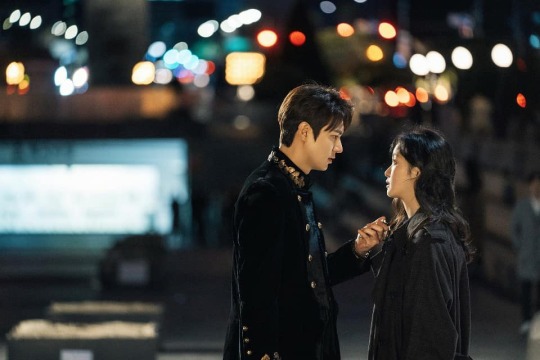
#the king eternal monarch#the king eternal monarch finale#kim go eun#lee min ho#woo do hwan#lee jung jin#kim kyung nam#jung eun chae
66 notes
·
View notes